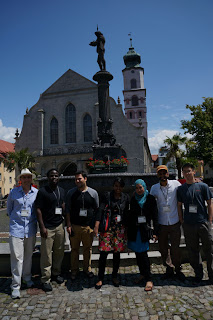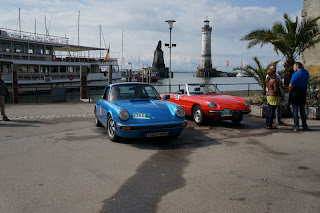We, the seventy young researchers of the US delegation to the Lindau Meeting, finally land at Zurich international airport. Everyone is excited and the adventure of our young careers has begun, founding friendships with some the best from the US.
It was lightly raining, really a good mist. The mist somehow catalyzed the realization that this is real, I’m actually going to Lindau, and I am so lucky to be a part of this opportunity to interact with the movers of our little planet.
The bus ride through the Swiss, then Austrian, and finally German countryside towards Lindau was invigorating, with light raindrops dragging sideways across the windows, as Josh and I call out cars – Dude, an Audi S4 ... Wow, an M5 ... No way, a Firebird, lol! But as we drew nearer to Lindau, rays of sunshine pierced through the diffuse clouds, just as our bus passed along the bridge connecting the island town of Lindau to the mainland.
Welcome to the 63rd Lindau Meeting of Nobel Laureates.
So what was my first experience at Lindau? Upon arrival and in a matter of a few, outgoing hours I met a tiny but wonderful sample of the spectrum of diverse young, fellow scientists here at Lindau: Nathalie from Belgium who studies supramolecular chemistry at South Hampton (UK); Sergio from Italy and I discussed how the local ducks managed to build large, floating nests. I was smiling and everyone was smiling back.
Later on, I was off to meet Martin Freeth (formerly of the BBC and currently with Nature publishing). Five exceptional people vied, vigorously at times, for three seats at a table to talk about what’s wrong with drug discovery with Nobel Laureates Brian Kobilka and Ada Yonath. There, I met Janet from Canada who studies virology at Heidelberg (Germany) and taught basic German phrases to Stephen and I; Stephen from Stanford; and Rene, a PhD student in the Philippines and native of the Philippines who studies natural plant products native to his home as potential new, potent drugs.
Blue skies meet me on my first morning in Lindau
After an amazing, hearty traditional German breakfast, it was off for a little adventure. On Sunday in Lindau, essentially everything is closed. It felt like John, Amy, and I owned the place, until we managed to make our way to the harbor, where a vintage car show was taking place. Parked under a perfect morning sun, abreast the old harbor of Lindau were classic Mercedes convertibles, Porsches, Bimmers, MGs, the lot. And all of them were in pristine condition. Not a bad way to start the day.
While I found out I won’t be participating in the Lindau Nature video with Laureates Kobilka and Yonath, I am being considered for writing a piece, perhaps in collaboration with a Laureate, which would be published with Nature. That would be awesome!
At the end of this sensational, breathtaking morning, I wondered how it could get much better. How much more memorable could the day become?
At the opening ceremony of the Meeting that evening, I tried to arrive early to get a good seat. Apparently, I wasn’t the only person thinking the early bird sits next to the Laureates. Calling on my street smarts, I slide past the long line of people, spied a VIP-looking section of four seats next to the stage, walked smoothly, smiling past the security and took a seat. Actually, it wasn’t sneakiness that won me the best seat in the house (with three other Americans following my lead). Rather, it was Stony Brook smarts. Thus, for the opening ceremony, I was sitting less than one meter from the Countess Bettina Bernadotte. She was beautiful. The ceremony was beautiful. The vibe was beautiful.
Ok, things can’t get much cooler than that, right?
After meeting and chilling with Professor Walther Kohn for a few minutes while we were leaving the Inselhalle, I attended the Microsoft Fellows Discussion at the Lake Lounge, Hotel Helvetia. Overlooking a peaceful Lindau Harbor, our table of young researchers, among six tables, included young researchers from Turkey, France, UK, and US. Dorothee Belz, Vice Chairwoman of the Committee Economics and Politics in the European Economic Senate and VP Microsoft Europe prompted us to answer some important questions. The first, “what is the sociopolitical impact of the Internet,” was profound. Our group, led by myself, responded, “The Internet, via cell phones and social networks is making democracy a democracy again.” Indeed, the Arab spring, which now seems to have stretched its spirit all the way to Brazil (note that my mom is from Curitiba, Brazil), arose from social networks that were born from the Internet. A camera crew was there, and a cell phone passed from table to table as each group presented its responses to the questions. My fellow young researchers and I believe it was Bill Gates on that phone.
What will tomorrow bring? A full day of science at the highest level, an unprecedented, unparalleled experience in fellowship and knowledge spreading, curiosity and discovery, is what I can expect, given the awesomeness thus far.
… kevin eduard hauser
Photo captions:
Top: Young researchers at Lindau City Square. I am at left.
Middle: Vintage car show at Lindau Harbor, the start of the Lindau Klassic race.
Bottom: The US host an international dinner at the Inselhalle restaurant on Sunday evening.




